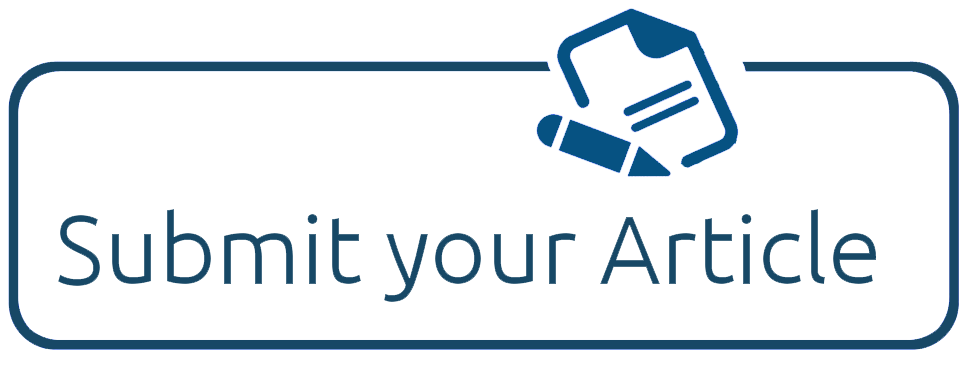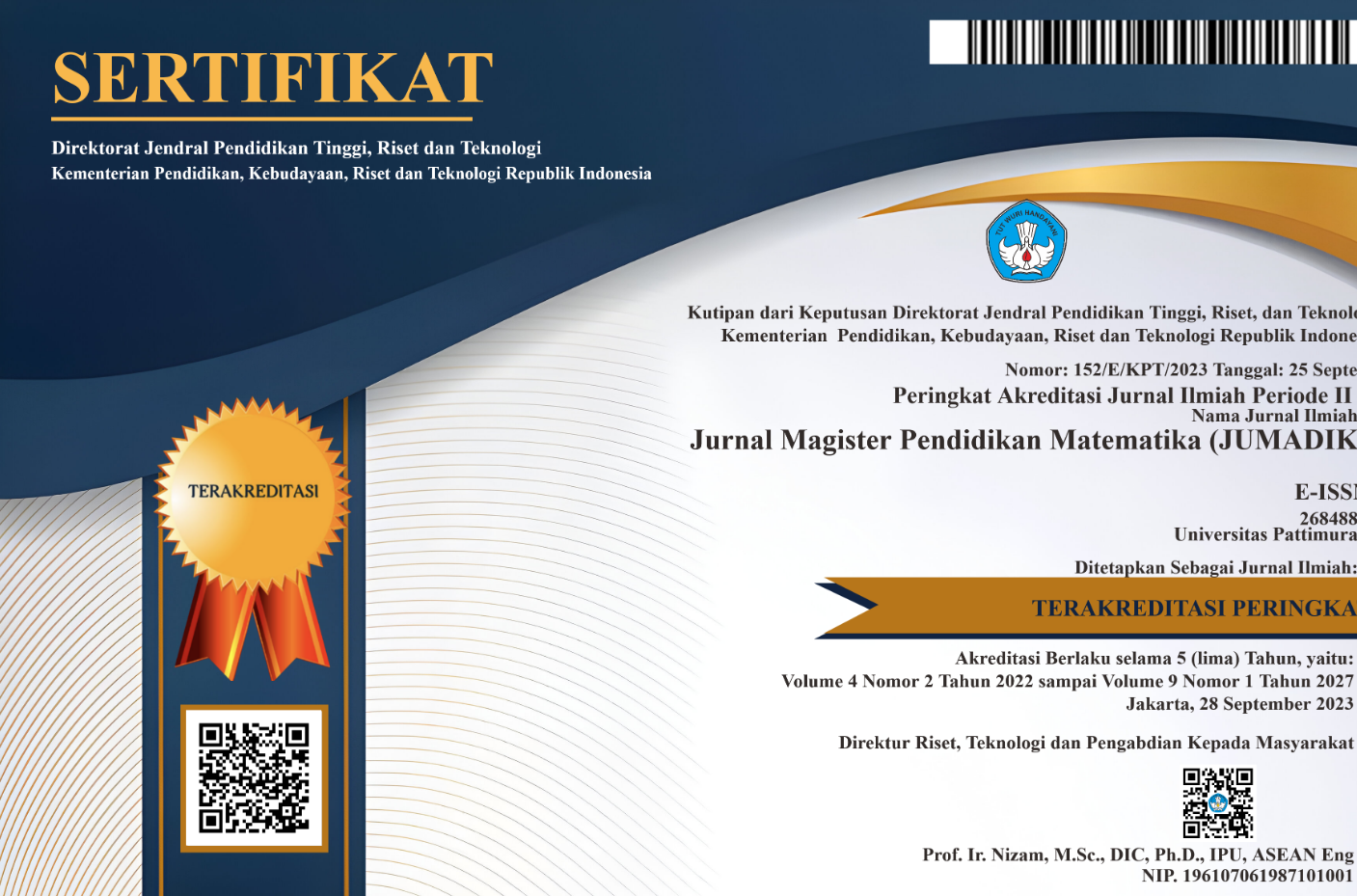PEMBELAJARAN GRUP INVESTIGASI BERBANTUAN SPSS PADA MATA KULIAH STATISTIK UNTUK MENINGKATKAN KEMAMPUAN BERPIKIR KRITIS DAN SELF CONCEPT MATEMATIS MAHASISWA FKIP
Abstract
Penelitian ini bertujuan untuk menganalisis peningkatan kemampuan berpikir kritis dan self-concept matematis mahasiswa dengan menggunakan model pembelajaran group investigation (GI) berbantuan SPSS dan model pembelajaran konvensional. Tipe Penelitian ini adalah eksperimen kuasi dengan desain pre-test-post-test control group design. populasi dalam penelitian ini adalah mahasiswa Jurusan Pendidikan Bahasa Indonesia. Melalui teknik purposive sampling, dua kelas dipilih sebagai sampel yaitu sebagai kelas eksperimen dan kelas kontrol. Instrumen yang digunakan berupa soal tes kemamuan berpikir kritis dan angket skala self- concept. Analisis data kemampuan berpikir kritis matematis dan self concept menggunakan uji Mann Whitney dari nilai gain yang diperoleh. Hasil penelitian menunjukan bahwa, (1) Terdapat perbedaan kemampuan berpikir kritis dan self-concept matematis mahasiswa yang diajarkan dengan menggunakan model GI berbantuan SPSS dari mahasiswa yang diajarkan dengan menggunakan model konvensional; dan (2) Terdapat peningkatan kemampuan berpikir kritis kelas eksperimen sebesar 0,4 dan kelas kontol sebesar 0,3 sedangkan self-concept matematis mahasiswa yang pembelajarannya menggunakan model pembelajaran GI (eksperimen) yaitu sebesar 79,93 lebih baik daripada mahasiswa yang pembelajarannya menggunakan model pembelajaran konvensional (control) sebesar 65,12
Downloads
References
Artini, dkk. (2015). Penerapan Model Pembelajaran Kooperatif Tife Group Investigation Untuk Meningkatkan Aktivitas dan Hasil Belajar IPA pada Siswa Kelas VI SD Impres 1 Tondo. Universitas Tadulako.e-Jurnal Mitra Sains Vol. 3. No. 1, Januari 2015.
Ayodele, J.O. (2011). Self-concept and Performance of Secondary School Students in Mathematics. Journal of Educational and Developmental Psychology. 1(1), 49-54.
Budianti, Y & Purwaningsih, A. (2018). Meningkatkan Kemampuan Berpikir Kritis dengan Menggunakan Model Cooperative Tipe Group Investigation Pada Siswa Kelas V SD Negeri Harapan Jaya 1 Bekasi Utara. Jurnal Pedagogik Vol. VI, No. 1, Februari 2018
Fahradina, N, dkk. (2014). Peningkatan Kemampuan Komunikasi Matematis dan Kemandirian Belajar Siswa SMP dengan Menggunakan Model Investigasi Kelompok. Jurnal Didaktik Matematika ISSN: 2355-4185 Vol 1. No 1. Sept 2014
Joyce, B., Weil, M., & Calhoun, E. (2009). Models of Teaching. Model-Model Pengajaran (Terjemahan edisi delapan). Yogyakarta: Pustaka Pelajar
Juniartina, P. P (2015). Pengaruh Model Pembelajaran Kooperatif Group Investigation Terhadap Pemahaman Konsep dan Kemampuan Berpikir Kritis Siswa Kelas XI IA SMA Negeri 4 Singaraja. Proceedings Seminar Nasional FMIPA UNDIKSHA V Tahun 2015. Hal 188-194
Liberina, H. (2012). Peningkatan Kemampuan Berpikir Kritis Matematis Siswa Melalui Penggunaan Metode Improve Pada Materi Sistem Persamaan Linear Dua Variabel. Jurnal Formatif Vol 2, Nomor 3, Hal 190-197. ISSN:2088-351X
Pamungkas, S. A. (2015). Kontribusi Self Concept Matematis Dan Mathematics Anxiety Terhadap Hasil Belajar Mahasiswa. Jurnal Dinamika Pendidikan (JDP). Volume 8, Nomor 2, Juli 2015. Hal 55-60.
Pranata, E. (2016). Implementasi Model Pembelajaran Group Investigation (GI) Berbantuan Alat Peraga untuk Meningkatkan Kemampuan Pemahaman Konsep Matematika. Jurnal Pendidikan Matematika Indonesia Vol. 1 No 1 bulan Maret 2016. Halaman 34-38 p-ISSN: 2477-5967 e-ISSN: 2477-8443
Rahman, R. (2012). Hubungan antara self-concept terhadap matematika dengan kemampuan berpikir kreatif matematika siswa. Infinity Jurnal Ilmiah Program Studi Matematika STKIP Siliwangi Bandung, Vol 1, No.1, Februari 2012. Hal 19-30 e-ISSN: 2460-9285
Salamor, R. (2013). Pembelajaran Group Investigation dalam upaya peningkatan kemampuan berpikir dan Self Concept Matematis siswa Sekolah Menengah Pertama. Thesis. Bandung: UPI
Turmudi. (2009). Landasan Filsafat dan Teori Pembelajaran Matematika; Berparadigma Eksplorasi dan Investigasi. Jakarta: Leuser Cita Pustaka
Yara, P.O. (2010). Student's Self-Concept and Mathematics Achievement in Some Secondary school on Southwestern Nigeria. European Journal of Social Sciences, Vol 13, No 1, 127-132
Copyright (c) 2021 Magy Gaspersz, Reinhard Salamor

This work is licensed under a Creative Commons Attribution-NonCommercial-ShareAlike 4.0 International License.
License and Copyright Agreement
In submitting the manuscript to the journal, the authors certify that:
- They are authorized by their co-authors to enter into these arrangements.
- The work described has not been formally published before, except in the form of an abstract or as part of a published lecture, review, thesis, or overlay journal. Please also carefully read Jurnal Magister Pendidikan Matematika (JUMADIKA) Posting Your Article Policy.
- That it is not under consideration for publication elsewhere,
- That its publication has been approved by all the author(s) and by the responsible authorities – tacitly or explicitly – of the institutes where the work has been carried out.
- They secure the right to reproduce any material that has already been published or copyrighted elsewhere.
- They agree to the following license and copyright agreement.
Copyright
Authors who publish with Jurnal Magister Pendidikan Matematika (JUMADIKA) agree to the following terms:
- Authors retain copyright and grant the journal right of first publication with the work simultaneously licensed under a Creative Commons Attribution-NonCommercial-ShareAlike 4.0 International License (http://creativecommons.org/licenses/by-nc-sa/4.0/) that allows others to share the work with an acknowledgment of the work's authorship and initial publication in this journal.
- Authors are able to enter into separate, additional contractual arrangements for the non-exclusive distribution of the journal's published version of the work (e.g., post it to an institutional repository or publish it in a book), with an acknowledgment of its initial publication in this journal.
- Authors are permitted and encouraged to post their work online (e.g., in institutional repositories or on their website) prior to and during the submission process, as it can lead to productive exchanges, as well as earlier and greater citation of published work.








